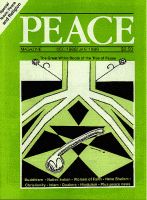
Peace Magazine Dec 1988-Jan 1989, page 27. Some rights reserved.
Search for other articles by Jordan Bishop here
John Finnis, Joseph Boyle, and German Grisez, Nuclear Deterrence, Morality and Realism Oxford: Oxford University Press, 1987. 429pp.
This is a serious work by three traditional moralists whose roots are in the Roman Catholic tradition, and in the mainstream of the Judeo-Christian tradition known as the Just War Theory. This is referred to by the authors as "the common morality." It involves accepting certain moral absolutes --that some acts are always ethically wrong, regardless of circumstances, regardless of good to be achieved or evil to be avoided by them. A good and praiseworthy end does not justify means that are evil in themselves.
The authors are familiar with most Roman Catholic, Protestant, and secular literature on the morality of nuclear "deterrence," as it is defined in the West -- and the doctrine of deterrence is much the same in the East. They conclude, after careful analysis, that deterrence, as accepted by Western Powers, is simply immoral. It necessarily involves an intention, however conditional, to kill millions of innocent human beings. This being so, unilateral disarmament is a moral duty for those living in countries that practice nuclear deterrence.
An analysis is given of consequentialism -- certain theoretical ethical approaches that have been applied to the question of deterrence. Readers who are not philosophers or theologians may find this difficult going. It is, nevertheless, necessary to the development of their argument, particularly since most consequentialists end up justifying nuclear deterrence on this basis. The authors' handling of these theories is tough-minded, professional, serious, and respectful.
The sophistication of their ethical analysis contrasts markedly with their bizarre assumptions concerning the political objectives of the Soviet Union. This is Cold War thinking at its worst: It is assumed that, were it not for the nuclear deterrent, the Marxist monolith would move to take over the world. These political and historical assumptions are not the result of critical analysis or historical investigation. And while the possibility of "nuclear blackmail" by the Soviets is mentioned, the real history of nuclear blackmail by the United States is ignored. Nor is there a mention of the Soviets' unilateral test ban and the U.S.'s callous disregard of it.
In spite of this serious flaw, the book is a courageous statement of the ethical case for unilateralism. Conventional wisdom, particularly in the West, has condemned unilateralism out of hand and the Catholic Bishops of the U.S., France, and Great Britain have compromised on the side of deference to political authority. The book is a must for all concerned with the ethics of nuclear deterrence.
Jordan Bishop teaches at University College of Cape Breton.

Peace Magazine Dec 1988-Jan 1989, page 27. Some rights reserved.
Search for other articles by Jordan Bishop here